Vacuum-Compatible Ø1" and 25 mm Post Systems
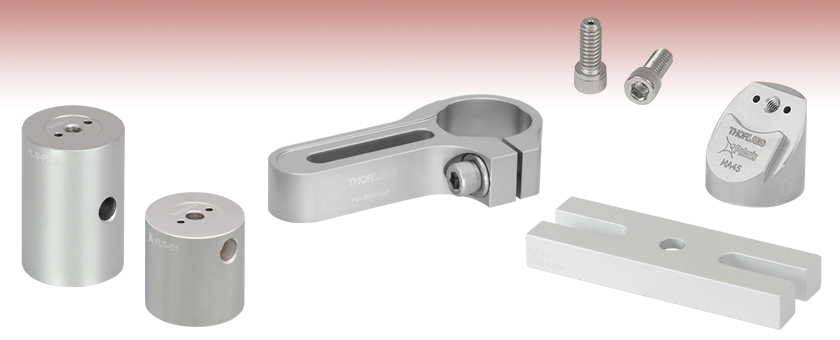
- Ø1" (25 mm) Post System Components for Vacuum Use
- All Components are Shipped Double Vacuum Bagged
- Constructed of 316, 303, and A4 Stainless Steel and
6061-T6 Aluminum
SH25S063V
Vented Cap Screws
BA1V
Ø1/2" Post Holder Base
POLARIS-MA45
45° Mounting Adapter
POLARIS-CA1
Clamping Arm
PLS-P150
Ø1" Post
PLS-C1
Ø1" Post,
#8 Counterbore

Please Wait
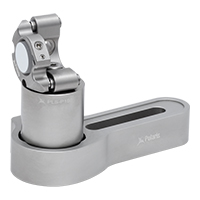
Click to Enlarge
Figure 1.1 Vacuum-Compatible Ø1" Post System: POLARIS-K05, PLS-P150, and POLARIS-CA1
Additional Vacuum-Compatible Components
Many of our other optomechanical components can be special ordered for vacuum use. Contact Tech Support for details.

Click to Enlarge
Figure 1.2 All vacuum-compatible components are packaged inside a double vacuum bag.
Features
- Vacuum-Compatible Versions of Popular Optomechanical Components
- Ø1" (25 mm) Post System Includes Posts, Clamping Arms, Post Holder Bases, Cap Screws, and 45° Mounting Adapter
- All Components Compatible with ≤10-5 Torr Environments Directly Out of the Packaging
- Compatible with Lower Pressures with Additional User Processing
- All Components are Shipped Double Vacuum Bagged for Cleanroom Use
This page features vacuum-compatible versions of our most popular Ø1" (25 mm) optomechanical components. These components are fabricated from specially-selected grades of stainless steel and aluminum for vacuum and cleanroom use. As shown in Figure 1.2, all components are packaged in double airtight bags for cleanroom and vacuum chamber applications. We also offer Ø1/2" vacuum-compatible optomechanical components.
Vacuum Compatibility Information
Our vacuum-compatible optomechanics are chemically cleaned and prepared for vacuum applications before packaging. They are compatible directly out of the packaging with vacuum environments down to ≤10-5 Torr. With additional cleaning and processing, they can be used at even lower pressures (see the Vacuum Specs tab or Tables G1.1, G2.1, G7.1, 468A, and 474B), only limited by the outgassing rate of the aluminum or stainless steel. The material properties of the aluminum or stainless steel and the cleaning methods completed by the end user should be used to determine the appropriateness of these products and materials in a specific vacuum system.
We also offer other optomechanical components which may be used in vacuum applications. Many of our Polaris mirror mounts are vacuum-compatible. We also offer unanodized aluminum breadboards, which may be used in vacuum applications after undergoing cleaning and processing by the end user.
Cleanroom-Compatible Packaging
Each vacuum-compatible post system component is packaged within two vacuum bag layers after assembly in a clean environment, as seen in Figure 1.2. The vacuum-tight fit minimizes rubbing against the bag, preventing the introduction of bag material shavings that would contaminate the clean component. In the vacuum-sealing process, moisture-containing air is drawn out of the packaging. This eliminates unwanted surface reactions without the need for desiccant materials.
The vacuum bags protect the component from contamination by air or dust during transport and storage, and the double-vacuum bag configuration allows for a straightforward and effective cleanroom entry procedure. The outer bag can be removed outside of the cleanroom, allowing the contaminant-free inner bag to be placed into a clean container and transferred into the cleanroom while retaining the benefits of vacuum-bag packaging. Inside the cleanroom, the inner bag can be removed when the component is ready for use.
Vacuum Compatibility Specs
| Item | Ø1" (Ø25 mm) Posts | Clamping Arms | Post Holder Bases | Vented Cap Screws and Washers | 45° Mounting Adapters |
|---|---|---|---|---|---|
| Vacuum Compatibility as Packageda |
>10-5 Torr | >10-6 Torr | |||
| Materials | 303 Stainless Steel | Arm: 303 Stainless Steel Screw: 18-8 Stainless Steel |
6061-T6 Aluminum | 316 Stainless Steel (Imperial) A4 Stainless Steel (Metric) |
303 Stainless Steel |
| Preparation and Packaging |
Chemically Cleaned and Double Vacuum Bagged | ||||
Non-Bridging Clamping Arm Testing
Various tests were conducted to show the performance of our non-bridging clamping Arms. Many of the results were then compared to other industry-standard products that were put to the same test to show the high-quality performance of the non-bridging clamping arms when used with our Ø1" Posts for Polaris Mounts. Similar performance can be expected across the family of non-bridging clamping Arms. Click the links below for more information about a specific test.
- Laser Platform Deformation
- Determine the extent to which an industry-standard clamping fork deforms or permanently damages a stainless steel rigid platform, and whether or not the non-bridging clamping arm improves upon or prevents this damage.
- Post and Platform Mounting Torque
- Determine the ideal amount of clamping torque necessary to (1) securely mount a post within the flexure clamp bore of a non-bridging clamping arm and (2) to secure the clamping arm into a laser system. This data was then compared to the closest competitor's industry-standard clamping fork design.
- Post Breaking Torque
- Determine the amount of torque needed to break a Ø1" PLS-P150 post loose from a non-bridging clamping arm that was holding it.
- Post Deflection
- Determine how much a post for Polaris mounts will temporarily and permanently deflect when it is mounted within a non-bridging clamping arm and a force is applied.
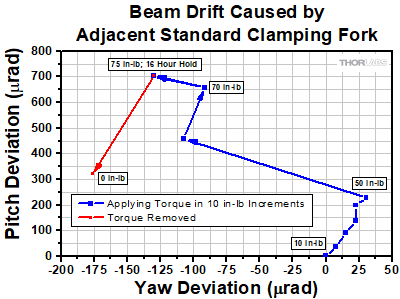
Click to Enlarge
Figure 3.1 Industry-Standard Clamping Fork Beam Drift
Laser Platform Deformation
Purpose: This testing was performed to determine the extent to which an industry-standard clamping fork deforms or permanently damages a stainless steel rigid platform and whether or not the non-bridging clamping arm improves upon or prevents this damage. The POLARIS-CA1 clamping arm was used for this test; similar results can be expected for all other non-bridging clamping arms. These measurements show that the non-bridging clamping arm significantly reduces temporary deformation to the surface and that no permanent damage was measured during our extensive tests.
Procedure: An industry-standard clamping fork was mounted in close proximity to another optical element that was used for aligning a beam onto a position detector. As the clamping fork was mounted to the platform at various torque values (blue data sets in Figure 3.1 and Figure 3.2), the yaw and pitch deviation of the beam was measured at the detector. At 75 in-lb of torque, the fork was left attached to the platform for 16 hours. After the 16 hour period, the fork was released from the table and the final beam deviation was recorded (red data sets in Figure 3.1 and Figure 3.2). This procedure was repeated for the
Results: As can be seen in Figures 3.1 and 3.2, the industry-standard clamping fork created a yaw and pitch deviation of 131 µrad and 702 µrad, respectively, at 75 in-lb, while the POLARIS-CA1 clamping arm created a yaw and pitch deviation of 12.2 µrad and 61 µrad, respectively, at 75 in-lb. The POLARIS-CA1 also returned the beam to its initial position when released after a 16 hour hold. The industry-standard clamping fork did not return the beam to its original position; the beam stayed at a yaw and pitch deviation of 176 µrad and 321 µrad, respectively. The simulation results shown in Figures 3.3 and 3.4 show the amount of deformation created by an industry-standard clamping fork compared to the POLARIS-CA1 clamping arm.
Conclusion: The POLARIS-CA1 clamping arm caused no permanent damage to the optical mounting surface and it significantly minimized the deformation to the platform surface when it was in use (see Figures 3.3 and 3.4). The industry-standard clamping fork was shown to permanently damage the laser platform after use, and to create severe deformation to the surface while in use. As a result, the non-bridging clamping arm is ideal for use in systems requiring long term stability and consistent, precision alignments.
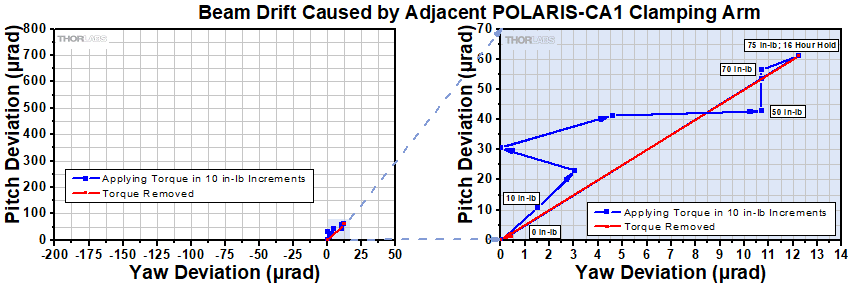
Click for Details
Figure 3.2 Note that the distortion caused by the non-bridging clamping arm at 75 in-lb is comparable to the distortion caused by the industry-standard clamping fork at 10 in-lb.
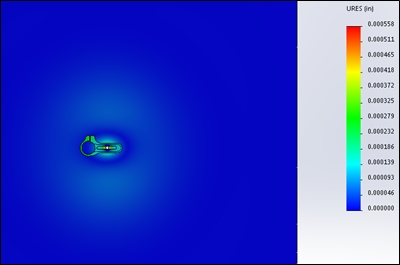
Click to Enlarge
Figure 3.4 In comparison, the POLARIS-CA1 clamping arm causes minimal deformations around the fork. Note that the scale on this second plot has been magnified by 10X in order to make these minimal deformations visible.
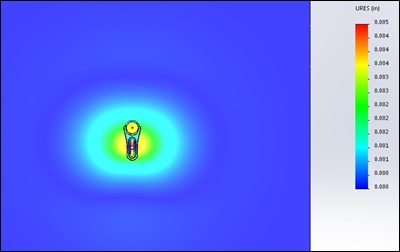
Click to Enlarge
Figure 3.3 The industry-standard clamping fork causes large deformations over a significant area surrounding the fork.
Mounting Torque
Purpose: This testing was performed to determine the ideal amount of clamping torque necessary to (1) securely mount a Ø1/2" or Ø1" post within the flexure clamp bore of a compatible non-bridging clamping arm and (2) to secure the clamping arm into a laser system. This data was then compared to the closest competitor's industry-standard clamping fork design.
Procedure: The POLARIS-CA1(/M) arm was used to hold a standard Ø1" post and the POLARIS-CA5(/M) arm was used to hold a PLS-Hx series Ø1/2" post. The clamping arm was first bolted to a stainless steel rigid platform, and the 1/4"-20 (M6 x 1.0) screw that controls the flexure clamp was actuated to specific torque values. At each torque value, the post had a rotational torque applied around its axis until it moved within the clamping arm's bore. The torque value at the moment directly before this "movement point" is called the holding torque (see Figures 3.6, 3.8, 3.9, and 3.10). Using similar methods, a mounting slot test was performed to find the ideal torque needed to secure the clamping arm to the laser platform. The mounting slot test was repeated for the POLARIS-SCA1 to determine if the slot size affects the torque measurements.
Results Summary: For optimal performance, the flexure clamping screw of an imperial Ø1" clamping arm should be tightened with 15 to 25 in-lb of torque and the flexure clamping screw of a metric Ø1" or Ø25 mm clamping arm with 1.75 to 3 N•m of torque. When mounting to a table or platform, we recommend using 40 to 65 in-lb of torque for an imperial Ø1" clamping arm and 4.75 to 7 N•m of torque for a metric Ø1" or Ø25 mm clamping arm. The POLARIS-CA5(/M) clamping arm has identical torque parameters of 30 to 40 in-lb (4.0 to 4.5 N•m). Please see below for the detailed results.
Conclusion: The non-bridging clamping arms were shown to be the ideal solution for securely mounting a component to a laser system platform. At only 20 in-lb and 40 in-lb of clamping torque for the flexure clamp and mounting slot respectively, a post mounted in an imperial Ø1" clamping arm can withstand up to 110 in-lb of opposing torque (corresponding torques for a metric Ø1" or Ø25 mm clamping arm are 2.4, 4.8, and 12.4 N•m, respectively). This performance is superior to the closest competitor's industry-standard clamping fork, which needs a clamping torque of 70 in-lb in the closed position to reach a similar value of 100 in-lb. For POLARIS-CA5(/M) clamp test results, please refer to the test results and plot links in Figures 3.6 and 3.8. As demonstrated in the Laser Platform Deformation test, minimizing the amount of torque applied to the mounting surface prevents permanent damage.
Test 1 Results: Flexure Clamp Holding Torque
As can be seen in Figure 3.6, at 20 in-lb of clamping torque, the POLARIS-CA1 provided 110 in-lb of holding torque. For reference, 110 in-lb of torque is enough to damage the threading on a 1/4"-20 stainless steel cap screw. The corresponding torque for the POLARIS-CA1/M is a holding torque of 12.4 N•m at a clamping torque of 2.4 N•m. The torque values for imperial and metric clamps are not a direct conversion due to an efficiency difference between 1/4"-20 and M6 x 1.0 screws. The efficiency of M6 screws is about 5% less than that of 1/4"-20 screws due to differences in diameter and pitch. All imperial Ø1" non-bridging clamping arms will perform similarly to the POLARIS-CA1, while all metric Ø1" or Ø25 mm non-bridging clamping arms will perform similarly to the POLARIS-CA1/M. The
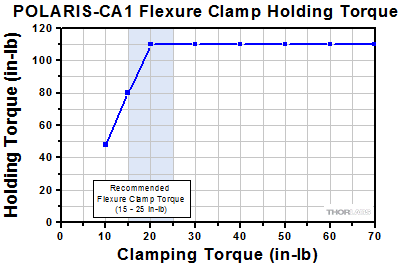
Click to Enlarge
Click for POLARIS-CA1/M Flexure Clamp Holding Torque Results
Click for POLARIS-CA5(/M) Flexure Clamp Holding Torque Results
Figure 3.6 Results from Test 1. The shaded region indicates the recommended flexure clamp torque. All imperial Ø1" non-bridging clamping arms will perform similarly to the POLARIS-CA1, while all metric Ø1" or Ø25 mm non-bridging clamping arms will perform similarly to the POLARIS-CA1/M.
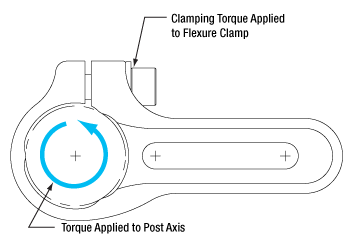
Click to Enlarge
Figure 3.5 Holding torque is measured at the moment directly before the "movement point" of the post being torqued.
Test 2 Results: Mounting Slot Holding Torque
The recommended torque for the mounting slot varies depending on the position of the 1/4"-20 (M6 x 1.0) cap screw within the slot (i.e. close to the post, midway along the slot, or far from the post). Figure 3.8 compares the slot holding torque of the POLARIS-SCA1 and POLARIS-CA1, and shows that the slot size does not affect the torque measurements. The recommended slot holding torque is
The performance of the closest competitor's clamping fork also depends on the position of the 1/4"-20 (M6 x 1.0) cap screw in the slot. However, as shown in Figure 3.9, the performance of the fork degrades sharply at the mid and far positions. At the far position, the best holding torque achieved is 32 in-lb with a clamping torque of 70 in-lb. As shown in Figure 3.10, at 40 in-lb of clamping torque, the POLARIS-CA1 provided 110 in-lb of holding torque, while at the same clamping torque, the competitor's fork only achieved a holding torque of 38 in-lb.
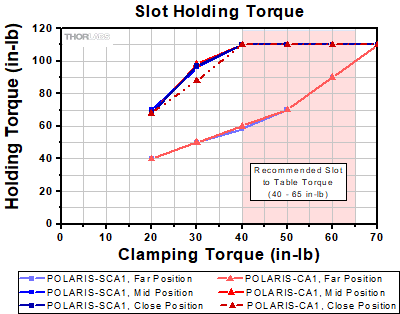
Click to Enlarge
Click for POLARIS-CA1/M Slot Holding Torque Results
Click for POLARIS-CA5(/M) Slot Holding Torque Results
Figure 3.8 Results from Test 2. The shaded region indicates the recommended torque to secure the clamping arm to the optical table. This comparison between the POLARIS-SCA1 and POLARIS-CA1 shows that the slot size does not affect the slot holding torque. All imperial Ø1" non-bridging clamping arms will perform similarly to the POLARIS-CA1, while all metric Ø1" or Ø25 mm non-bridging clamping arms will perform similarly to the POLARIS-CA1/M.
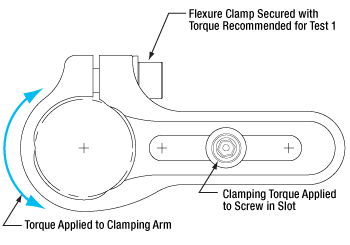
Click to Enlarge
Figure 3.7 Holding torque is measured at the moment directly before the "movement point" of the clamping arm being torqued.
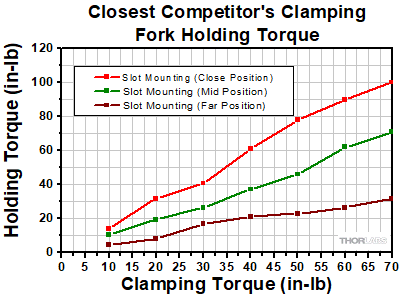
Click to Enlarge
Figure 3.9 Results from Test 2 on a competitor's Ø1" clamping fork. See Figure 3.8 for results from POLARIS-CA1(/M).
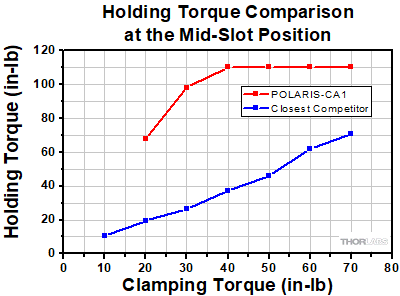
Click to Enlarge
Figure 3.10 Comparison of Test 2 results for POLARIS-CA1 and a competitor's Ø1" clamping fork, both at the middle position in the mounting slot.
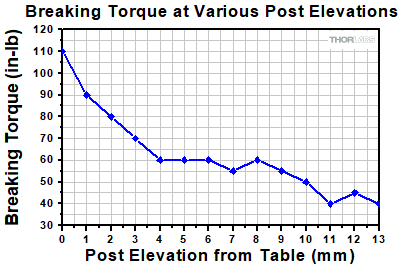
Click to Enlarge
Figure 3.12 Breaking force recorded with the post mounted at 14 different heights above the platform. This shows that upwards of 110 in-lb of torque is required to loosen the PLS-P150 post from the clamping arm when the post is in contact with the work surface.
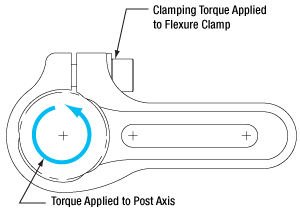
Click to Enlarge
Figure 3.11 Breaking torque is defined as the moment directly after the "movement point" of the post being torqued.
Breaking Torque
Purpose: This test was performed to determine the amount of torque needed to break a Ø1" PLS-P150 post loose from a non-bridging clamping arm. The POLARIS-CA1 clamping arm was used for this test; similar results can be expected for all other non-bridging clamping arms for Ø1" and Ø25 mm posts.
This test was repeated at various heights above the work surface.
Procedure: A PLS-P150 1.5" long, Ø1" post was secured with 25 in-lb of torque at various heights within a POLARIS-CA1 clamping arm, which was then secured to a custom laser platform. As shown in Figure 3.11, torque was then applied to the post axis until it reached its "movement point." This torque was recorded as the breaking torque.
Results: As can be seen in Figure 3.12, upwards of 110 in-lb (12.4 N•m) of torque is required to loosen the PLS-P150 post from the clamping arm. When the post was raised off of the platform by 13 mm, a torque of about 40 in-lb (4.5 N•m) was still required to loosen the post. It is important to note here that the clamping arm is only 15.2 mm (0.60") thick.
Conclusion: The PLS-P150 post and clamping arm create an extremely stable system that is resistant to large forces acting upon it, even when the post is raised off of the platform by 13 mm. This is ideal for any custom or OEM system that requires components to stay aligned when faced with vibrations caused by shipping and installation.
Post Deflection

Click to Enlarge
Figure 3.13 A force was applied to the PLS-P150 post 0.90" (22.9 mm) above the edge of the clamping arm with the post mounted at nine different heights off of the mounting surface. At each mounting height, the post deflection was measured during and after the application of the force.
Purpose: This test was performed to determine the amount of temporary and permanent deflection of a Ø1" post for Polaris mirror mounts secured in a non-bridging clamping arm when a force is applied. The POLARIS-CA1 clamping arm was used for this test; similar results can be expected for all other non-bridging clamping arms for Ø1" and Ø25 mm posts. For Ø1/2" clamping arms, we recommend a post-to-mounting-surface distance of 1 mm or less to prevent permanent deflection when a ≤45 N force is applied.
Procedure: A PLS-P150 1.5" long, Ø1" post was secured with 25 in-lb of torque at various heights within a POLARIS-CA1 clamping arm, which was then secured to a custom laser platform. A force was then applied to the center of the post, 0.90" (22.9 mm) above the top edge of the clamping arm (see Figure 3.13 for details). This test was conducted with the post mounted at nine different heights off of the platform, ranging from 0 mm to 8 mm. The amount of deflection was measured while the force was being applied (Figure 3.14) and after the force was removed (Figure 3.15).
Results: Figure 3.14 shows that the PLS-P150 post will deflect by <0.01 mm as a force of ≤40 N is applied for any post height ≤8 mm, and by <0.17 mm as a force of ≤133 N is applied for any post height ≤8 mm. These values show the temporary deflection of the post while the force is being applied. For all of the post mounting heights tested (0 to 8 mm), an applied force ≤35 N caused a permanent deflection of the post smaller than 0.005 mm, measured after the force was removed. For the two lowest mounting heights, 0 and 2 mm, no permanent deflection was measured for applied forces of 45 N or less. At 133 N, the maximum force applied, permanent deflection for all tested mounting heights remained below 0.07 mm. For Ø1/2" clamping arms, we recommend a post-to-mounting-surface distance of 1 mm or less to prevent permanent deflection when a ≤45 N force is applied.
Conclusion: Our Ø1" posts and POLARIS-CA1 clamping arm create an extremely stable system that is able to resist large forces acting upon it. This is ideal for any custom or OEM system that requires components to stay aligned when faced with vibrations caused by shipping and installation.
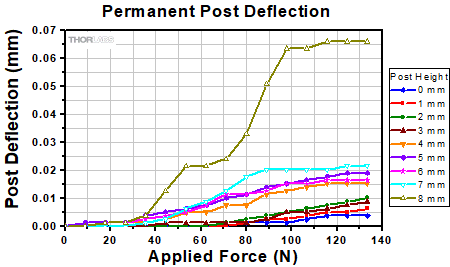
Click to Enlarge
Figure 3.15 Post deflection measured after the applied force was removed. The measurement was repeated with the bottom of the post positioned 0 to 8 mm above the mounting surface (see the Procedure section for details). For Ø1" post-to-mounting-surface distances of 2 mm or less, no permanent deflection was measured if the force was ≤45 N. For Ø1/2" clamping arms, we recommend a post-to-mounting-surface distance of 1 mm or less to prevent permanent deflection when a ≤45 N force is applied.
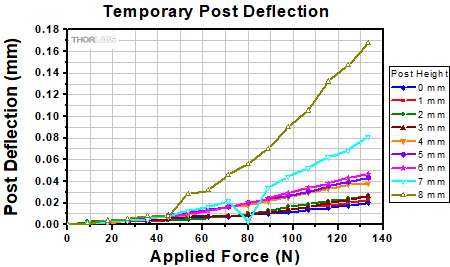
Click to Enlarge
Figure 3.14 Post deflection measured while a force was applied to the post. The measurement was repeated with the bottom of the post positioned 0 to 8 mm above the mounting surface (see the Procedure section for details).
POLARIS-MA45 Positional Repeatability After Thermal Shock
Polaris® components have undergone extensive testing to ensure high-quality performance. Here, a Polaris mirror mount was secured to a POLARIS-MA45 which was then secured to a stainless steel rigid platform in a temperature-controlled environment. A beam from an independently temperature-stabilized laser diode was reflected by the mirror onto a position sensing detector.
Purpose: This testing was done to determine how reliably the mirror mount and 45° mounting adapter system returns the mirror, without hysteresis, to its initial position. These measurements show that the alignment of the optical system is unaffected by the temperature shock.
Procedure: The temperature of the Polaris mount and adapter system tested was raised to 37.5 °C. This temperature shock was maintained for approximately 60 minutes (soak time, see Figures 4.1 and 4.2). Then the temperature of the mirror mount system was returned to the starting temperature. The results of these tests are shown in Figures 4.1 and 4.2.
Results: As can be seen in Figures 4.1 and 4.2, when the Polaris mount and adapter system were returned to their initial temperature, the angular position (both pitch and yaw) of the mirrors returned to within 2 µrad of its initial position. The performance of the Polaris system was tested further by subjecting the mount to repeated temperature change cycles. After each cycle, the mirror mount system position reliably returned to within 2 µrad of its initial position.
Conclusions: The Polaris 45° mounting adapter paired with a Polaris mirror mount is a high-quality, ultra-stable system that will reliably return a mirror to its original position after cycling through a temperature change. As a result, this system is ideal for use in applications that require long-term alignment stability. This also shows that the addition of the POLARIS-MA45 to the Polaris mirror mount does not compromise the performance of the mirror mount alone.

Click to Enlarge
Figure 4.1 This plot shows the pitch and yaw measured by a position-sensing detector before, while, and after a thermal shock was applied to the POLARIS-MA45 mounting adapter and Polaris mirror mount.
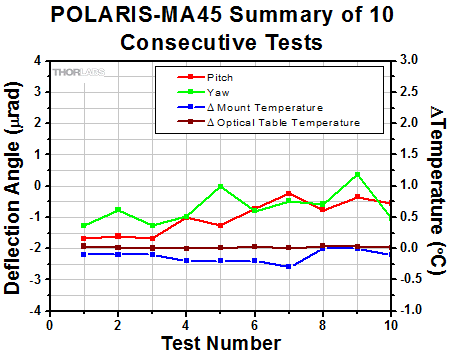
Click to Enlarge
Figure 4.2 This plot shows the final angular position of the system for 10 consecutive thermal shock tests. The change in temperature is the difference between the starting temperature and the temperature at the end of the test and includes factors such as the variation in room temperature.
Insights into Best Lab Practices
Scroll down to read about a practice we follow when setting up lab equipment.
- Bases: For Stability Orient the Side with the Undercut Down
Click here for more insights into lab practices and equipment.
Bases: For Stability Orient the Side with the Undercut Down
An undercut is machined into the bottom surface of bases like the BA2 (Figures 181A and 181B). The undercut creates feet, which are called pads. For maximum stability, the base should be oriented with its pads in contact with the table or breadboard.
The top surface of the base does not have an undercut and is the intended mounting surface for components.
Mounting the base upside down could result in the base rocking on the table or breadboard, or the base may exhibit other mechanical instability.
The Pads are Flatter than the Top Surface
The undercut is key to the flatness of the pads. The pads are machined flat after the undercut is made.
Friction heats the pads during the processing step that provides them with a maximally flat profile. By reducing the surface area of the pads, the undercut reduces the amount of heat generated during this step.
It is beneficial to minimize the heat generated during machining. Metal expands when heated, and the uneven heating that occurs during machining can distort the dimensions of the part. If the dimensions of the part are distorted during machining, the part can be left with high spots and other undesirable features after it cools. This can cause instability and misalignment when using the part.
Precision Instruments and Devices have Pads
Another example of a component with pads is the LX10 linear stage shown in Figure 181C.
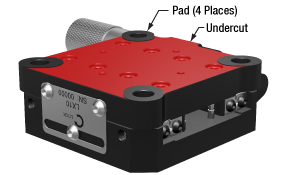
Click to Enlarge
Figure 181C Pads machined into Thorlabs' devices improve their stability when bolted in place. The pads are highly flat and project above the undercut region, which is highlighted red. The undercut limits the contact area with the table or breadboard.
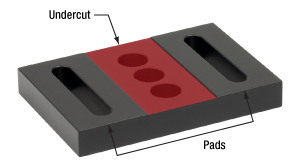
Click to Enlarge
Figure 181B This view of the bottom shows the undercut highlighted in red. By removing this material, the pads can be made maximally flat.
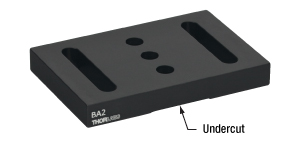
Click to Enlarge
Figure 181A For optimal stability, the base should be mounted with the undercut facing the optical table or breadboard.
Date of Last Edit: Dec. 9, 2019
| Posted Comments: | |
| No Comments Posted |

| Table G1.1 Vacuum Compatibility Specifications | |
|---|---|
| Vacuum Compatibilitya | 10-9 Torr at 25 °C with Proper Bake Out 10-5 Torr at 25 °C without Bake Out |
| Materials | 303 Stainless Steel |
| Preparation and Packaging | Chemically Cleaned and Double Vacuum Bagged |
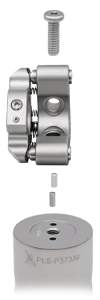
Click for Details
Figure G1.2 Directly attach a Polaris mount via a top-located 8-32 (M4) mounting hole without the need for a thread adapter. Dowel pins (not included) provide precision mounting.
OEM Solutions and Volume Orders
Thorlabs manufactures custom and high-volume Polaris products for use in custom and OEM systems. See our custom configurator below for our custom post options. High-volume discounts are built into the configurator, with a minimum order size of 26 posts required to receive the discount.
For pricing information on high-volume orders of our standard posts, please contact OEM Sales.
- Vacuum Compatible to 10-9 Torr at 25 °C with Proper Bake Out
- One Top-Located 8-32 (M4 x 0.7) Mounting Hole
- One Bottom-Located 1/4"-20 (M6 x 1.0) Mounting Hole
- Two Ø2 mm Alignment Pin Holes Around Each Tap for Precision Mounting
(Dowel Pins Not Included) - 303 Stainless Steel Heat-Treated to Remove Internal Stresses for Increased System Stability
- Large-Diameter Relief Cut on Top and Bottom for Mounting Stability
- Configurator Available Below for Custom Lengths and Usage Features
These posts are constructed from 303 stainless steel and heat-treated to remove internal stresses. Imperial posts are 1" in diameter and metric posts are 25 mm in diameter. Popular post lengths are available from stock; custom lengths can be requested using the configurator below or by contacting Tech Support.
Each post contains one top-located 8-32 (M4 x 0.7) mounting hole and a bottom-located 1/4"-20 (M6 x 1.0) mounting hole. The 8-32 (M4 x 0.7) mounting hole allows a mirror mount to be attached directly to the post, eliminating the need for thread adapters and thereby reducing the instability created when stacking multiple optomechanical components.
Created with OEM and custom systems in mind, each post features holes for DIN-7m6 ground dowel pins (not included) on either side of the central threaded hole at each end to aid with alignment. Securing posts and accessories within a system using dowel pins, as shown in Figure G1.2, prevents them coming loose due to vibrations, shipping, or incidental contact. To maintain vacuum compatibility, only vented screws and dowel pins should be used.
Alignment Bore
A Ø6 mm bore is located 20 mm above the base of the post to allow for fine alignment. The alignment bore will not be covered when these posts are secured with a non-bridging clamping arm, sold below. Please note that this bore does not go completely through the posts with lengths of 1.0" or shorter; these posts contain two bores on opposite sides, within ±0.3°, that are 0.20" (5.1 mm) deep. Given their shorter length, a through bore would interfere with the mounting threads, preventing anything from being securely attached to the post. Any post with a length of 1.49" (37.6 mm for metric posts) or less will have a similar alignment bore configuration.
Cleanroom and Vacuum Compatibility
These posts are designed to be compatible with cleanroom and vacuum applications. They are chemically cleaned using the Carpenter AAA passivation method to remove sulfur, iron, and contaminants from the surface. After passivation, they are double vacuum bagged so that they can be transported into a cleanroom environment without introducing contamination. Please contact Tech Support for details.
Polaris® Compatiblity
These posts were designed specifically for use with our Polaris optomechanical components. The optical axis heights that result when using these posts with our Polaris Mounts for optics up to Ø2" are provided in Table G1.3. Our Non-Bridging Clamping Arms, also available below, provide a solution for securing the posts to an optical table. Click here for more information on these posts including OEM mounting options, mounting stability details, and test data.
| Table G1.3 Polaris® Mount and Post Interoperabilitya | |||||||
|---|---|---|---|---|---|---|---|
| Item # | Post Length (L) |
Resulting Optical Axis Height (Optic Center) | |||||
| Ø1/2" Mountsb |
POLARIS-K05P2 Ø1/2" Mount |
Kinematic |
Ø1.5 mm Mount & Ø2" Fixed Mount |
Ø2" Kinematic Mounts |
|||
| 1.00" | 1.50" | 1.62" | 1.75" | 2.00" | 2.25" | 2.40" | |
| 1.50" | 2.00" | 2.12" | 2.25" | 2.50" | 2.75" | 2.90" | |
| PLS-P2 | 2.00" | 2.50" | 2.62" | 2.75" | 3.00" | 3.25" | 3.40" |
| PLS-P238 | 2.38" | 2.88" | 3.00" | 3.13" | 3.38" | 3.63" | 3.78" |
| PLS-P3 | 3.00" | 3.50" | 3.62" | 3.75" | 4.00" | 4.25" | 4.40" |
| PLS-P4 | 4.00" | 4.50" | 4.62" | 4.75" | 5.00" | 5.25" | 5.40" |
| 24.6 mm | 37.3 mm | 40.3 mm | 43.7 mm | 50.0 mm | 56.4 mm | 60.2 mm | |
| 37.3 mm | 50.0 mm | 53.0 mm | 56.4 mm | 62.7 mm | 69.1 mm | 72.9 mm | |
| PLS-P496/M | 49.6 mm | 62.3 mm | 65.3 mm | 68.7 mm | 75.0 mm | 81.4 mm | 85.2 mm |
| PLS-P605/M | 60.5 mm | 73.2 mm | 76.2 mm (3.00") | 79.6 mm | 85.9 mm | 92.3 mm | 96.1 mm |
| PLS-P746/M | 74.6 mm | 87.3 mm | 90.3 mm | 93.7 mm | 100.0 mm | 106.4 mm | 110.2 mm |
| PLS-P996/M | 99.6 mm | 112.3 mm | 115.3 mm | 118.7 mm | 125.0 mm | 131.4 mm | 135.2 mm |

| Table G2.1 Vacuum Compatibility Specifications | |
|---|---|
| Vacuum Compatibilitya | 10-9 Torr at 25 °C with Proper Bake Out 10-5 Torr at 25 °C without Bake Out |
| Materials | 303 Stainless Steel |
| Preparation and Packaging | Chemically Cleaned and Double Vacuum Bagged |
OEM Solutions and Volume Orders
Thorlabs manufactures custom and high-volume Polaris products for use in custom and OEM systems. For pricing information on high-volume orders of our standard posts, please contact OEM Sales.
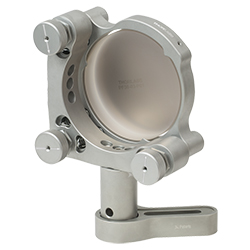
Click to Enlarge
View Imperial Product List
View Metric Product List
Figure G2.2 The three tapped holes on these posts line up with the counterbores on Ø2" and Ø3" Polaris optic mounts.
- Vacuum Compatible to 10-9 Torr at 25 °C with Proper Bake Out
- Three Top-Located 8-32 (M4 x 0.7) Taps
- One Bottom-Located 1/4"-20 (M6 x 1.0) Tap
- Two Ø2 mm Alignment Pin Holes Around Each Tap for Precision Mounting
(Dowel Pins Not Included) - 303 Stainless Steel Heat-Treated to Remove Internal Stresses for Increased System Stability
- Large-Diameter Relief Cut on Top and Bottom for Mounting Stability
- Custom Lengths and Usage Features are Available by Contacting Tech Support
These posts are constructed from 303 stainless steel and heat-treated to remove internal stresses. Imperial posts are 1" in diameter and metric posts are 25 mm in diameter. Popular post lengths are available from stock. Currently posts with three 8-32 (M4) mounting holes cannot be ordered using the configurator; custom lengths can be requested by contacting Tech Support.
Each post contains three top-located 8-32 (M4 x 0.7) mounting holes and a bottom-located 1/4”-20 (M6 x 1.0) mounting hole. The 8-32 (M4 x 0.7) threads allow a mirror mount to be attached directly to the post, eliminating the need for thread adapters and thereby reducing the instability created when stacking multiple optomechanical components.
Created with OEM and custom systems in mind, each post features holes for DIN-7m6 ground dowel pins (not included) on either side of the central threaded hole at each end to aid with alignment. Securing posts and accessories within a system using dowel pins prevents them coming loose due to vibrations, shipping, or incidental contact. To maintain vacuum compatibility, only vented screws and dowel pins should be used.
Alignment Bore
A Ø6 mm bore is located 20 mm above the base of the post to allow for fine alignment. The alignment bore will not be covered when these posts are secured with a non-bridging clamping arm, sold below. Please note that this bore does not go completely through the posts with lengths of 1.0" or shorter; these posts contain two bores on opposite sides, within ±0.3°, that are 0.20" (5.1 mm) deep. Given their shorter length, a through bore would interfere with the mounting threads, preventing anything from being securely attached to the post. Any post with a length of 1.49" (37.6 mm for metric posts) or less will have a similar alignment bore configuration.
Cleanroom and Vacuum Compatibility
These posts are designed to be compatible with cleanroom and vacuum applications. They are chemically cleaned using the Carpenter AAA passivation method to remove sulfur, iron, and contaminants from the surface. After passivation, they are double vacuum bagged so that they can be transported into a cleanroom environment without introducing contamination. Please contact Tech Support for details.
Polaris® Compatiblity
These posts were designed specifically for use with our Polaris optomechanical components. These posts are ideal for securing our Ø2" and Ø3" Polaris Mounts with more than one screw, and the resulting optical axis heights are provided in Table G2.3. Our Non-Bridging Clamping Arms, also available below, provide a solution for securing the posts to an optical table. Click here for more information on these posts including OEM mounting options, mounting stability details, and test data.
| Table G2.3 Polaris® Mount and Post Interoperabilitya | ||||
|---|---|---|---|---|
| Item # | Post Length (L) | Resulting Optical Axis Height (Optic Center) | ||
| Ø2" Fixed Mount | Ø2" Kinematic Mounts | Ø3" Mounts | ||
| 1.00" | 2.25" | 2.40" | 3.00" | |
| 2.00" | 3.25" | 3.40" | 4.00" | |
| PLS-T238 | 2.38" | 3.63" | 3.78" | 4.38" |
| PLS-T3 | 3.00" | 4.25" | 4.40" | 5.00" |
| PLS-T4 | 4.00" | 5.25" | 5.40" | 6.00" |
| 56.0 mm | 59.8 mm | 75.0 mm | ||
| 81.0 mm | 84.8 mm | 100.0 mm | ||
| PLS-T605/M | 60.5 mm | 92.3 mm | 96.1 mm | 111.3 mm |
| PLS-T746/M | 74.6 mm | 106.4 mm | 110.2 mm | 125.4 mm |
| PLS-T996/M | 99.6 mm | 131.4 mm | 135.2 mm | 150.4 mm |

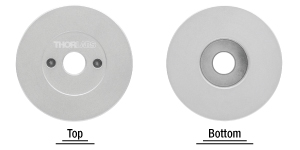
Click to Enlarge
Figure G3.1 Top and Bottom Views of Counterbored Posts
- Vacuum Compatible to 10-9 Torr at 25 °C with Proper Bake Out
- Counterbore Hole for #8 (M4) Mounting Screw and Washer
- Two Ø2 mm Alignment Pin Holes Around Mounting Hole for Precision Mounting (Dowel Pins Not Included)
These posts feature a #8 (M4) counterbore hole for optic mounts with threaded mounting holes up to Ø2". The top of the posts have two Ø2 mm alignment pin holes, which are located on either side of the counterbore hole. Dowel pins are not included. These posts are designed to mount to an optical surface using our non-bridging clamping arms for Ø1" posts.
A Ø6 mm alignment bore is located 20 mm from the base and can be used in combination with our cage rods for the alignment of multiple mounts along a common optical axis or for fine angle tuning. Note that the alignment bore does not go completely through the PLS-C1 and PLS-C246/M posts. Instead, these posts contain two bores on opposite sides, within ±0.3°, that are 0.20" (5.1 mm) deep. Given their shorter length, a through bore would interfere with the counterbore and prevent components from being securely attached to the post.
Popular post lengths are available from stock; custom lengths can be requested by contacting Tech Sales. Since the counterbore posts require non-bridging clamping arms for Ø1" posts or other optomechanical components for mounting to an optical surface, the minimum length for custom posts should not be less than the height of the mounting component, which is 0.60" (15.2 mm) for these non-bridging clamping arms.

| Table G5.1 Vacuum Compatibility Specifications | |
|---|---|
| Vacuum Compatibility as Packageda |
10-9 Torr at 25 °C with Proper Bake Out 10-5 Torr at 25 °C without Bake Out |
| Materials | Arm: 303 Stainless Steel Screw & Washer: 18-8 Stainless Steel |
| Preparation and Packaging |
Chemically Cleaned and Double Vacuum Bagged |
| Additional Vacuum Compatibility Information |
Grease Vapor Pressure: 10-13 Torr at 20 °C , 10-5 Torr at 200 °C |
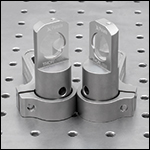
Click to Enlarge
Figure G5.2 The arm can be mounted with either flat surface in contact with the table, allowing for compact setups.
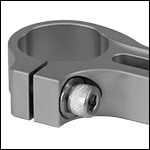
Click to Enlarge
Figure G5.3 Side-Located 1/4"-20 (M6) Screw Actuates Clamping Bore
- Vacuum Compatible to 10-9 Torr at 25 °C with Proper Bake Out
- 3-Point Contact Bore with Flexure Clamping Mechanism
- Versions for Ø1" or Ø25 mm Posts for Polaris Mounts and Ø1" Monolithic Polaris Mount (See Table G5.6)
- 0.60" Bore Depth Supports Height Adjustments Up to 0.25"
- Allows Posts to be Rotated 360°
- 0.75" (19.1 mm) or 1.30" (33.0 mm) Slot for 1/4"-20 (M6) Cap Screw
- Heat-Treated, Stress-Relieved Stainless Steel Provides Large Clamping Force
- Design Supports Left- and Right-Handed Orientations (See Figure G5.2)
- High Stability Ideal for Use with Our Kinematic Polaris Mirror Mounts
- ±0.001" (±0.02 mm) Surface Flatness
Thorlabs' Non-Bridging Clamping Arms are the ideal solution for stably mounting our Ø1" or Ø25 mm Posts for Polaris Mounts or Ø1" Monolithic Polaris Mount. Each clamping arm, which is machined from heat-treated, stress-relieved stainless steel bar stock, provides extremely high holding forces with minimal torquing of the mounting screws. See the Clamping Arm Data tab for holding torque results and test details.
The flat, non-bridging top and bottom surfaces of each clamping arm allow it to be used with either side in contact with an optical table or other mounting surface. This feature allows the clamp to be positioned in left- or right-handed orientations and optical components to be placed in near contact to one another while minimizing the footprint (see Figure G5.2). On each side of the arm, a relief cut around the slot protects the ±0.001" (±0.02 mm) flat surface from any marring due to the screw and washer, allowing for more stable mounting.
The clamping arms are offered with slot lengths of 0.75" (19.1 mm) or 1.30" (33.0 mm), providing flexibility when used in applications such as tight laser cavity setups. Four of our clamping arms are designed to hold Ø1" posts, while the remaining two are designed to hold Ø25 mm posts; see Table G5.6 for details. Note the arms with a Ø1" (25.4 mm) bore are not compatible with Ø25 mm posts; the bore diameter is too large and will not contact the post when clamping.
Non-Bridging Design: Industry Standard Clamping Fork
vs.Thorlabs' Non-Bridging Clamping Arm
Industry standard clamping forks are designed with a bridge, as shown in Figure G5.4, for clamping to pedestal-style posts or post holders. This design will slightly damage the laser platform during each use by pulling up the part of the platform located under the bridge. The Thorlabs clamping arm, as shown in Figure G5.5, is designed with a flat top and bottom to eliminate this problem.
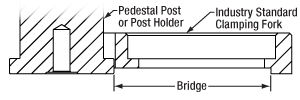
Click to Enlarge
Figure G5.4 A Bridge Is Created When an Industry Standard Clamping Fork Is Used with a Pedestal Post
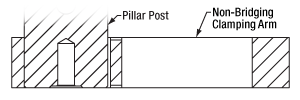
Click to Enlarge
Figure G5.5 The Thorlabs Clamping Arm Eliminates the Bridge Created by an Industry Standard Clamping Fork
The flexure clamp, shown in Figure G5.3, is actuated using a side-located 1/4"-20 (M6 x 1.0) cap screw and allows a post to be rotated 360° about its center. As the flexure clamp and mounting slot are secured with separate screws, the position of the arm and the rotational alignment of the post can be adjusted independently. While best performance is achieved with full post engagement, the 0.60" (15.2 mm) thick mounting bore supports up to 0.25" of post height adjustment.
The non-bridging clamping arm design has undergone extensive testing to ensure high-quality performance; see the Clamping Arm Data tab. For optimal performance, we recommend tightening the flexure clamping screw of an imperial clamping arm with 15 to 25 in-lb of torque and the flexure clamping screw of a metric clamping arm with 1.75 to 3 N•m of torque. When mounting to a table or platform, we recommend using 40 to 65 in-lb of torque for an imperial clamping arm and 4.75 to 7 N•m of torque for a metric clamping arm. Please note that the values for imperial and metric clamps are not a direct conversion due to an efficiency difference between 1/4"-20 and M6 x 1.0 screws. The efficiency of M6 x 1.0 screws is about 5% less than that of 1/4"-20 screws due to differences in diameter and pitch. For best results, use the maximum recommended torques from each range. These torque values can be dialed in using a torque driver.
| Table G5.6 Specifications | ||||
|---|---|---|---|---|
| Item # | Compatible Post Size |
Clamping Screw |
Slot Length | Footprint |
| POLARIS-SCA1 | Ø1" (25.4 mm) |
1/4"-20 (3/16" Hex) |
0.75" (19.1 mm) |
2.78" x 1.60" (70.5 mm x 40.6 mm) |
| POLARIS-CA1 | 1.30" (33.0 mm) |
3.33" x 1.60" (84.5 mm x 40.6 mm) |
||
| POLARIS-SCA1/M | M6 x 1.0 (5 mm Hex) |
0.75" (19.1 mm) |
2.78" x 1.60" (70.5 mm x 40.6 mm) |
|
| POLARIS-CA1/M | 1.30" (33.0 mm) |
3.33" x 1.60" (84.5 mm x 40.6 mm) |
||
| POLARIS-SCA25/M | Ø25.0 mm (Ø0.98") |
0.75" (19.1 mm) |
2.78" x 1.60" (70.5 mm x 40.6 mm) |
|
| POLARIS-CA25/M | 1.30" (33.0 mm) |
3.33" x 1.60" (84.5 mm x 40.6 mm) |
||

- Mount Ø1/2" Post Holders and Other Components to an Optical Table or Breadboard
- Vacuum-Compatible Design (>10-6 Torr)
- Double Vacuum Bagged for Cleanroom Environments
- Same Stability and Footprint as Our Standard Mounting Bases
These vacuum-compatible bases are similar to our standard mounting bases, which allow post holders to be secured to an optical table in a variety of position. A 3/8" (10 mm) long 1/4"-20 (M6) vented cap screw (SH25S038V for imperial or SH6MS10V for metric) is recommended for attaching post holders to our mounting bases.

| Table G7.1 Vacuum Compatibility Specifications | |
|---|---|
| Vacuum Compatibility as Packagedb |
>10-6 Torr |
| Material | 303 Stainless Steel |
| Preparation and Packaging |
Chemically Cleaned and Double Vacuum Bagged |
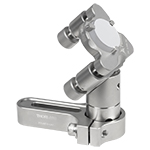
Click to Enlarge
Figure G7.2
POLARIS-MA45 Mounts Optics at a 45° Angle with Respect to the Working Surface
- Vacuum Compatible to 10-9 Torr at 25 °C with Proper Bake Out
- Designed for Use With All Ø1" or Ø25 mm Polaris Mounts
- Bottom-Located 1/4"-20 (M6) Tap Allows for Attachment to Ø1" (Ø25.0 mm) Posts
- Two Ø2 mm Alignment Pin Holes in the Base for Precision Mounting in OEM Systems
- Heat-Treated 303 Stainless Steel
The POLARIS-MA45(/M) 45° Mounting Adapters securely mount Ø1" or Ø25 mm Polaris Mounts at a 45° angle with respect to the optical table, breadboard, or working surface. The adapter has an 8-32 (M4) tap on the 45° face for securing the mirror mount, and a bottom-located 1/4"-20 (M6) tap for attachment to Ø1" (Ø25.0 mm) Posts. Two Ø2 mm (non-vented) alignment pin holes around each tap allow for direct, precision mounting within custom or OEM systems.
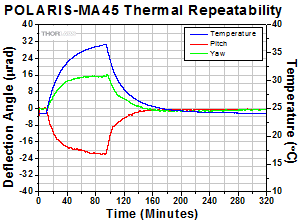
Click to Enlarge
Figure G7.3 Each Polaris product undergoes extensive thermal testing to ensure high-quality performance. Please see the 45° Mounting Adapter Data tab for additional test results.
When using our standard Ø1"or Ø25 mm Polaris mounts, the height to the center of the mirror will be 2" from the base of the mounting adapter when using the
This adapter is made from heat-treated 303 stainless steel, which has a relatively low coefficient of thermal expansion (CTE) and matches the material used in all of our Polaris mounts. Heat treating the materials used removes the internal stresses that can cause temperature-dependent hysteresis. Matching the CTE of materials within an optical setup is essential to achieve optimal thermal repeatability. Therefore, when mounting, we only recommend using components fabricated from the same material. This is shown in Figure G7.3, where a POLARIS-K1F mirror mount,

| Table 474B Vacuum Compatibility Specifications | |
|---|---|
| Vacuum Compatibility as Packageda |
>10-6 Torr |
| Materials | 316 Stainless Steel (Imperial) A4 Stainless Steel (Metric) |
| Preparation and Packaging |
Chemically Cleaned and Double Vacuum Bagged |
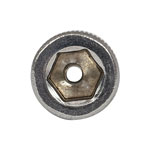
Click to Enlarge
Figure 474A These cap screws have a central Ø0.0625" (Ø1.6 mm) vent.
- 1/4"-20 and M6 x 1.0 Cap Screws with Vents for Vacuum Applications
- 1/4" (M6) Vacuum-Compatible Washers
- Constructed of 316 or A4 Stainless Steel
- Vacuum-Compatible Design (>10-6 Torr)
- Double Vacuum Bagged for Cleanroom Environments
- We Also Offer Standard Cap Screws in a Variety of Sizes
These cap screws and washers are constructed from 316 or A4 stainless steel. They have a central Ø0.0625" (Ø1.6 mm) hole through the body of the screw to serve as a vent, allowing trapped gas to escape from a blind hole when a vacuum chamber is pumped down.
| Item # | Length | Hex | Material | Quantity |
|---|---|---|---|---|
| SH25S038V | 3/8" (9.5 mm) | 3/16" | 316 Stainless Steel | 5 |
| SH25S050V | 1/2" (12.7 mm) | 5 | ||
| SH25S063V | 5/8" (15.9 mm) | 5 | ||
| SH25S075V | 3/4" (19.1 mm) | 5 | ||
| SH25S100V | 1" (25.4 mm) | 5 | ||
| SH6MS10V | 10 mm (0.39") | 5 mm | A4 Stainless Steel | 5 |
| SH6MS12V | 12 mm (0.47") | 5 | ||
| SH6MS16V | 16 mm (0.63") | 5 | ||
| SH6MS20V | 20 mm (0.79") | 5 | ||
| SH6MS25V | 25 mm (0.98") | 5 | ||
| W25S050V | 1/4" Washer (M6 Compatible) | 316 Stainless Steel | 25 | |
 Products Home
Products Home













 Zoom
Zoom
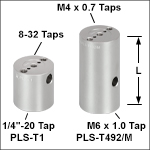
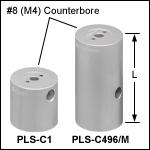
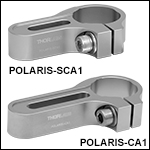
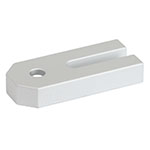
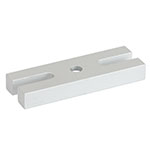
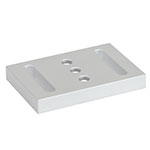
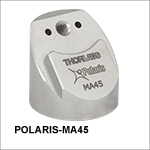
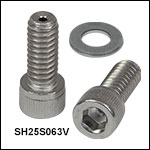
 Ø1" Post System
Ø1" Post System